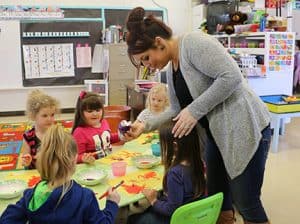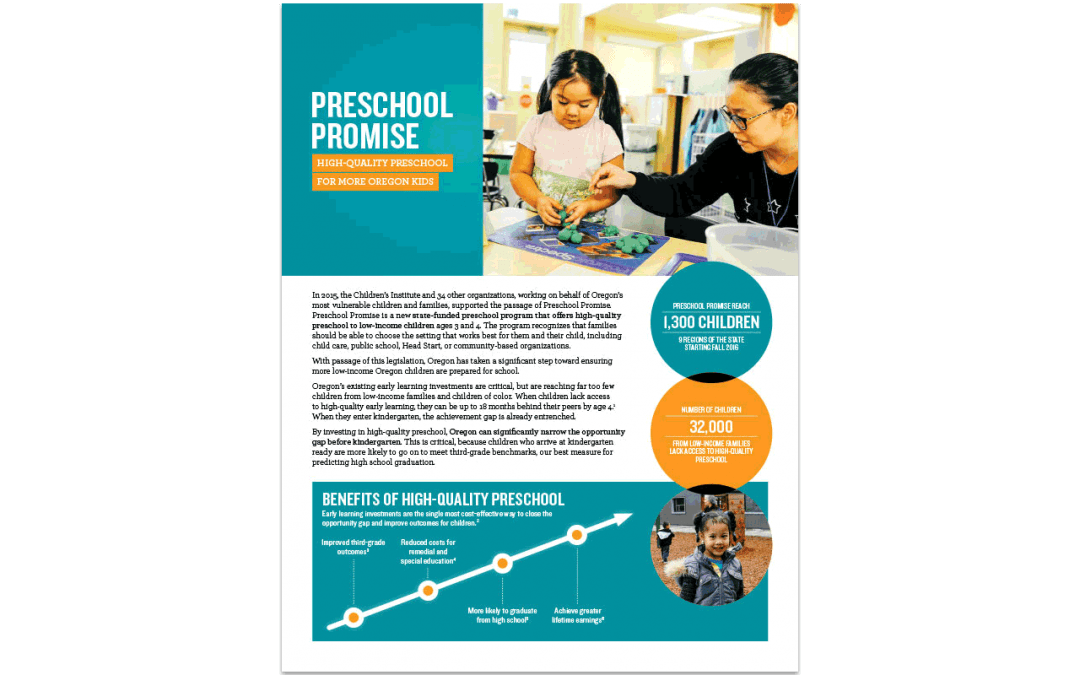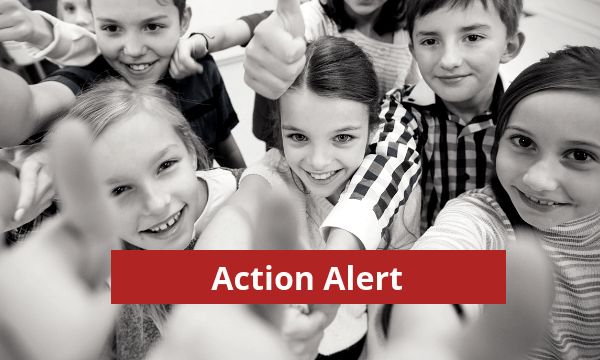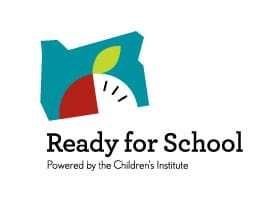“What rhymes with three?” Cunningham asks, holding three fingers high.
“Tree!” A girl in pink shouts.
“I like it,” says Cunningham.
“He played knick-knack on his tree,” they sing.
Cunningham is a frequent visitor to the preschool class, which is taught and operated by lifelong Yoncalla resident Cassie Reigard. Reigard is operating the preschool that was started decades ago by her grandmother – who just recently passed away. Reigard’s mother ran the preschool after her grandmother, and Cassie took over when her mother retired.
The Yoncalla school district provides space at the elementary school for Reigard to operate the program. And this year, the partners that are part of the Early Works initiative at Yoncalla have supported Reigard to receive professional development and assistance that will help her students be ready to succeed in kindergarten. Teaching preschool is in Reigard’s blood and she is a great person for Early Works to support. After all, she has dedicated her career to Yoncalla’s young children.
 “I love the kids. I love watching them learn; I love teaching them,” Reigard says.
“I love the kids. I love watching them learn; I love teaching them,” Reigard says.
The professional development and help that the Yoncalla School District and other Early Works partners have provided Reigard has resulted in a new opportunity for her to serve more kids from low-income Yoncalla-area families. The South-Central Oregon Early Learning Hub – its service area includes Yoncalla – was one of nine early learning hubs in Oregon that last month was awarded some of the new state funding to support high-quality preschool for children from low-income Oregon families. Some of that funding now will be going to help kids in Yoncalla.
The Children’s Institute has worked closely with the state to ensure the passage and develop the program, called Preschool Promise. The program will support high-quality preschools in a mix of settings, including public schools, Head Start and private, community-based programs.
Jan Zarate, Yoncalla School District superintendent, said Reigard and the school district submitted a joint application for the Preschool Promise funding; the South Central early learning hub plans to fund their effort. “We are going to get the opportunity to pull more partners to the table and do more braiding of funds” says Jan Zarate, Yoncalla School District superintendent.
When she heard the news, Reigard says, she was ecstatic. “I feel very excited for the children in our community and the opportunities this will provide for them,” she says.
Zarate says that while the support from the school district and other Early Works partners was important in helping to secure the Preschool Promise funding, so was Reigard’s experience and foundation in the Yoncalla community.
“Cassie’s capacity to build relationships with people and make them comfortable is amazing. Parents trust her,” says Zarate. “There are also areas to grow and there is a personal commitment on Cassie’s part to know more and be even better prepared.”
Reigard says the Early Works support for her professional development is very helpful. “I’m always open to improving anything that I can,” she says.
 At a recent conference at Umpqua Community College in Roseburg, she learned some new strategies to help her students understand the reasons behind their feelings. “I’ve struggled with some students in class that don’t know how to handle their feelings and so I’ve really been able to take them aside and talk about their feelings and really just work on supporting them emotionally,” she says.
At a recent conference at Umpqua Community College in Roseburg, she learned some new strategies to help her students understand the reasons behind their feelings. “I’ve struggled with some students in class that don’t know how to handle their feelings and so I’ve really been able to take them aside and talk about their feelings and really just work on supporting them emotionally,” she says.
A very important new tool was added to Reigard’s teaching arsenal this spring: the Ages & Stages Questionnaire, or ASQ. A developmental screening survey that is simple for parents to complete, the ASQ pinpoints developmental progress in children up to age five, allowing teachers, caregivers, and service providers to understand what individual supports a child might need to be healthy and ready for school.
Almost all of the preschool parents agreed to participate, and Reigard loved conducting the screening survey. “It was one of the best things I could have done to develop a more personal relationship with parents and to understand their children better,” she says.
In addition to relationship-building, the screening survey helped Reigard tailor her instruction to her students’ needs and interests. “Not only did it show what I need to work on in specific areas with the students, but it clarified reasons why some students were more behind than others, not just academically.”
Finally, the screening survey led to Reigard being able to refer several students to additional programs and services that will help the students in their learning.
In the future, Reigard plans to conduct the ASQ screening in the fall, ideally even before school starts, to inform her teaching from the beginning. “My goal is to connect with families and work together with them to help prepare their children for kindergarten,” she says.
Early Works is focused on supporting Reigard, and other teachers and service providers in Yoncalla, to learn and hone new strategies to help students succeed. At the same time, the Children’s Institute is working hard at the state level to help advocate and secure funding for programs like Preschool Promise.

 Passed by the 2015 Legislature, we are excited that Preschool Promise will begin serving 1,300 children from low-income families in September. The program opens the door to diverse high-quality preschool providers and gives families the opportunity to choose the setting that best meets their needs.
Passed by the 2015 Legislature, we are excited that Preschool Promise will begin serving 1,300 children from low-income families in September. The program opens the door to diverse high-quality preschool providers and gives families the opportunity to choose the setting that best meets their needs.
 “I love the kids. I love watching them learn; I love teaching them,” Reigard says.
“I love the kids. I love watching them learn; I love teaching them,” Reigard says. At a recent conference at Umpqua Community College in Roseburg, she learned some new strategies to help her students understand the reasons behind their feelings. “I’ve struggled with some students in class that don’t know how to handle their feelings and so I’ve really been able to take them aside and talk about their feelings and really just work on supporting them emotionally,” she says.
At a recent conference at Umpqua Community College in Roseburg, she learned some new strategies to help her students understand the reasons behind their feelings. “I’ve struggled with some students in class that don’t know how to handle their feelings and so I’ve really been able to take them aside and talk about their feelings and really just work on supporting them emotionally,” she says. Last week, Oregon’s Early Learning Division announced their Preschool Promise award recommendations. The announcement marks an important step in the state’s process to increase publicly funded preschool opportunities for low-income children in Oregon. Preschool Promise, or House Bill 3380, was passed by the Oregon Legislature in 2015 with the goal of providing high-quality preschool in a variety of settings. Preschool Promise expands the types and number of providers that can receive funding for high-quality preschool programs in the state, and increases the number of families and children that are able to access the services. Early Learning Division staff estimate that the implementation of Preschool Promise will mean that approximately 1,300 more Oregon children will receive high-quality preschool in the 2016-2017 school year.
Last week, Oregon’s Early Learning Division announced their Preschool Promise award recommendations. The announcement marks an important step in the state’s process to increase publicly funded preschool opportunities for low-income children in Oregon. Preschool Promise, or House Bill 3380, was passed by the Oregon Legislature in 2015 with the goal of providing high-quality preschool in a variety of settings. Preschool Promise expands the types and number of providers that can receive funding for high-quality preschool programs in the state, and increases the number of families and children that are able to access the services. Early Learning Division staff estimate that the implementation of Preschool Promise will mean that approximately 1,300 more Oregon children will receive high-quality preschool in the 2016-2017 school year.
 In 2015, the Oregon Legislature made a promise to Oregon’s children. They invested in Preschool Promise, a program that will provide high-quality preschool to more than 1,000 kids from low-income families.
In 2015, the Oregon Legislature made a promise to Oregon’s children. They invested in Preschool Promise, a program that will provide high-quality preschool to more than 1,000 kids from low-income families.